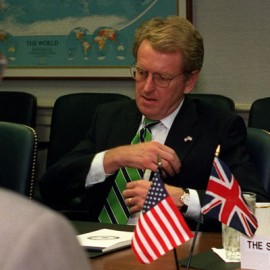
A documentary on BBC4 last night about the debt that Britain racked up after the second world war borrowing money from the Americans. The presenter was Sir Christopher Meyer, former British ambassador to the United States: he made quite a good presenter, perhaps a better presenter than ambassador. (He was our man in Washington during the Iraq war.) However, I can’t be so complimentary about the programme.
At the risk of turning into a grumpy old man before I am old enough, the programme suffered from the current TV habit of inviting famous people to comment on events rather than people with expert knowledge. The heart of the story was John Maynard Keynes’s forlorn attempt to obtain a gift of $5 billion from the American government, in gratitude for the British war effort and in recognition that Britain was about to go bankrupt. You might have looked for comment from historians of the period: instead, we got officials from the administration of President Bush.
One of those officials was Karl Rove, Bush’s campaign strategist (boo! hiss! it is still pantomime season). He was asked to comment on where Keynes went wrong in putting the British case. What he said was that the argument should have been that it was in the American national interest to have acceded to the British request, rather than putting it in terms of the British national interest. Convenient for him, you might think. But let’s look at the history of the time a bit more closely.
Certainly the British had worn themselves out financially in the war, but the coming of the peace did not bring those financial exertions to a halt. A major war aim was to protect the empire, and protecting the empire remained expensive even after the war was over. In the late 1940s, of course, the Americans were rather unimpressed by the British desire to remain an imperial power. Why should they pay for that, they not unreasonably asked. They were against colonialism, after all.
Back to 2007, was George W Bush’s right hand man ever going to say that the British mistake was to try and imagine itself a global power rather than opting for a constructive role in Europe instead? A historian might have said that: the apparatchik did not.
In the end, the Americans made a loan to Britain rather than a gift as Keynes had hoped, but followed shortly after with a grant, too. That grant was the Marshall Plan. Here is my second gripe about the programme.
The Marshall Plan was described as a “free gift”, but there was more to it than that. The change in American policy – grants, not loans – was provoked by the Soviet takeover of central and eastern Europe in 1948 and a rising fear of communism. The idea that western Europe might also go the same way was a threatening one, and needed to be resisted. Hence the grant to prop up worn-out and war-ravaged economies. The additional condition was that the recovery plan should be “a joint one, agreed to by a number of, if not all, European nations”. The Soviet Union banned its occupied countries from taking part, but much of the rest of Europe took part. This means that there was no American grant to Britain: there was an American grant to the British part of Europe. But of this, from Sir Christopher, there was no mention.
British participation in European integration was an essential part of economic recovery, and American support for that integration was assured and important. Karl Rove could have said this, but he didn’t. (A central theme of this website is that the things politicians decline to say are as important as the things they do say. Here is an example.)
The concluding scenes of the documentary, attempting to explain the importance of the “special relationship”, give me complaint number three.
Sir Christopher Meyer’s argument is that Britain and America have a special relationship but that Britain should not subordinate its national interest in doing so. The American rejection of the request for a gift in 1947 shows that they will not place our interest above their own, but the American role in winning the second world war showed that they are our most important friends.
But, where does this leave the rest of Europe. If the British and Americans have a special bond because they both fought on the same side in the 1940s, the French can claim the same special bond, too. Both Britain and France were saved from the Nazis by American assistance; not only the British, but the French, too. But who talks of the French special relationship with America?
The idea that the second world war remains, or should remain, the foundation of our relationship with any other country is absurd. No-one would say that the British relationship with Germany should be based on that period. This part of the programme was just nonsense.
Sixty years ago, maybe, but not now. The whole point of a mortgage is that you can pay it off.
